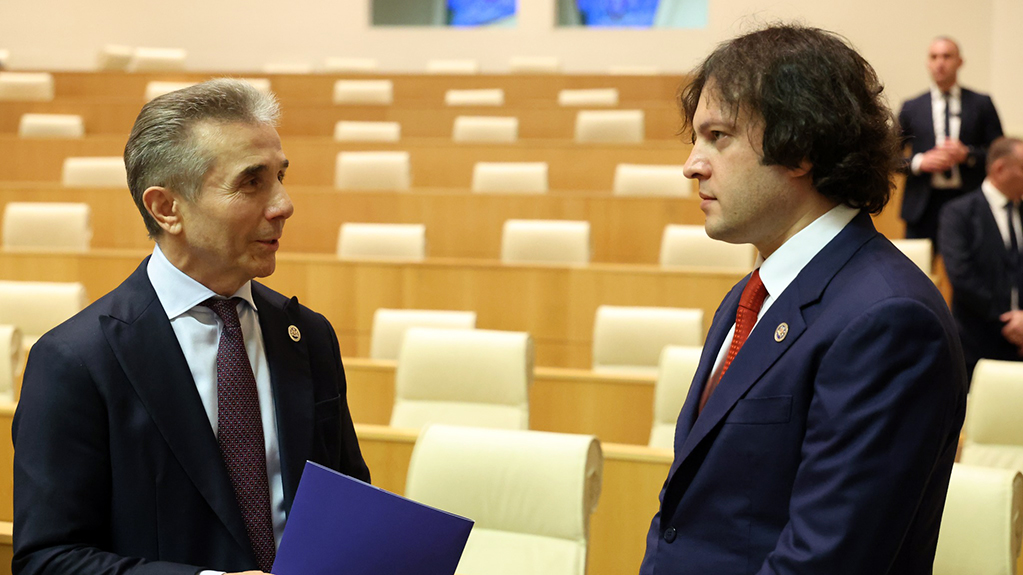Georgia's illegitimate Prime Minister, Irakli Kobakhidze, who announced yesterday the suspension of the country's European integration process, today accused EU Ambassador Pawel Herczynski of spreading disinformation. He attempted to convince the public that Georgia's accession to the European Union is still a realistic prospect.
News
Trending stories
- 1 Former Prime Minister Garibashvili Sentenced to Five Years in Prison After Plea Deal
- 2 Otar Partskhaladze Charged with Organizing Murder of Businessman Levan Jangveladze
- 3 Shalva Papuashvili Says Georgian Dream Filed Complaint with BBC
- 4 Georgian Dream Party Further Tightens Grants Law, Introducing Up to 6 Years in Prison
Herczynski called the statement “that Georgia is not interested in continuing its European integration for the next four years” “sad,” adding that it contradicts the policy of all previous Georgian governments.
“Our decision yesterday was followed by a disinformation campaign led by the main purveyors of falsehoods, the radical opposition, its affiliated NGOs, and media outlets.
They lied to the public, claiming that the Georgian government had stopped the European integration process. It is unfortunate that EU Ambassador Pawel Herczynski also joined this disinformation campaign.
However, given that the EU Ambassador was directly involved in election campaigning in favor of the radical opposition and against the ruling team before the elections - a clear violation of the Vienna Convention and democratic electoral principles - his disinformation statement was less surprising to us.
Herczynski, who claimed before the elections that Georgia’s European integration process with the EU was suspended, now asserts that this process was halted by the Georgian government. For some time, we have refrained from diplomatic reactions to such events. However, everything has its limits, and if we do not see a change in behavior in the future, we will definitely react to such actions, both toward the EU Ambassador and other relevant ambassadors,” Irakli Kobakhidze said, specifying that the government was considering a diplomatic response.
“The first step is to summon the ambassador to the Ministry of Foreign Affairs. This is the first diplomatic reaction the government can take. Of course, this is the step we would take if we do not see a change in behavior,” Kobakhidze added.
The illegitimate Prime Minister also reiterated at a briefing today that his government remains committed to Georgia’s European course. He called the issue of opening accession negotiations and EU budget grant financing an “artificial tool of blackmail.”
“Fulfilling the obligations outlined in the Association Agreement is the practical path to the EU. We once again declare that within four years, we will have fulfilled more than 90% of these obligations. Therefore, not only will we not slow down our pursuit of the EU, but on the contrary, we will do everything possible to maximize our efforts in this regard,” Kobakhidze stated.
However, the illegitimate Prime Minister said nothing about the nine steps, the fulfillment of which is a mandatory prerequisite for progress on the European integration path.
In December 2023, Georgia was granted EU candidate status with the stipulation that the government would take steps in nine areas. In its Enlargement Report, published at the end of October 2024, the European Commission noted that the granting of candidate status did not result in sufficient political will on the part of the government to implement the reforms necessary to advance the country’s EU path.
“On the contrary, significant negative developments, including the adoption of the Law on Transparency of Foreign Influence and the Legislative Package on Family Values and Protection of Minors, as well as strong anti-EU narratives by Georgian officials, have severely impacted Georgia’s EU trajectory. As a result, Georgia’s accession process has been de facto halted,” the European Commission assessed, adding that Georgia’s progress in implementing the nine steps was insignificant.
The European Commission also stated that it would not be able to issue a recommendation to open negotiations with Georgia unless the government “changes its current course of action, which jeopardizes its path toward the European Union, and demonstrates tangible efforts to resolve outstanding issues and implement key reforms.”
On November 28, Irakli Kobakhidze announced that, according to the decision of the Georgian Dream, Georgia will not put the issue of opening negotiations on the agenda until the end of 2028 and will refuse budget grants from the European Union.















